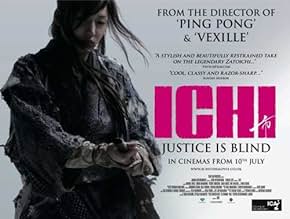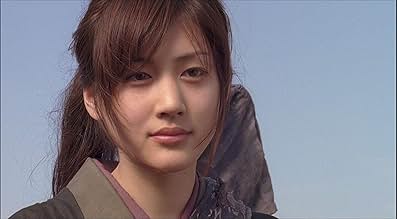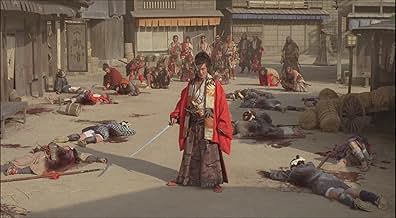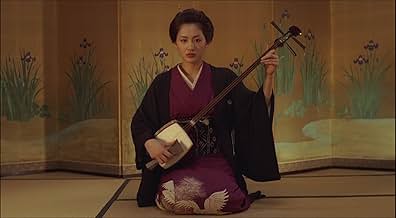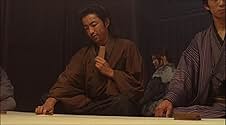PUNTUACIÓN EN IMDb
6,5/10
4,1 mil
TU PUNTUACIÓN
Añade un argumento en tu idiomaIchi is a blind woman who roams about town with her shamisen (a three-stringed Japanese guitar), but she has exceptional sword skills with which she fights off yakuza and other villains.Ichi is a blind woman who roams about town with her shamisen (a three-stringed Japanese guitar), but she has exceptional sword skills with which she fights off yakuza and other villains.Ichi is a blind woman who roams about town with her shamisen (a three-stringed Japanese guitar), but she has exceptional sword skills with which she fights off yakuza and other villains.
- Dirección
- Guión
- Reparto principal
- Premios
- 1 premio en total
Reseñas destacadas
Epic! I loved this movie! The action scenes are really cool. the swordplay is a lot of fun. there are some bullet-time action scenes. the classic blind samurai portrayed through a lonesome girl is very intriguing. it's going to catch your attention and take you into ichi's world. ichi is special because, we feel for her, become attached to her, and don't want to see her suffer. "ichi" envelopes you through sound and hearing. we all know she is blind, and develop a keen sense of the sounds that trigger events. the shots are very cool, soothing, and warm colors express vibrancy and visual sensation. the play on sounds pulls the viewer into "ichi's" vision-less world. it's easy to fall in love with the main characters, because they have so much personality, and are very charismatic. i highly recommend this movie! It was awesome from beginning to end!
ICHI is a Japanese samurai movie with a twist: the blind warrior of the title is a woman in this one. Heavily based on the popular and long-running ZATOICHI series of films, the story sees Ichi ending up in a small town that's been overrun by bandits. The plot is complicated when another swordsman, traumatised by the events of his past, falls in love with her, is mistaken for an expert swordsman, and becomes the town's protector.
There are shades of YOJIMBO in the look, style, and feel of this production, but it manages to be a successful film in its own right. It also reminded me a little of AZUMI, although ICHI is more drama than action focused. And it's in the characters and the human drama where this film excels: there's emotion to spare in this story, along with characters you learn and care about throughout, and the acting as a whole is superior for the production.
ICHI is hardly an action packed movie but there are some key moments that impress, alongside an extended climax that makes up for some of the slower points in the story. The swordplay is over with pretty quickly, as is the norm for samurai cinema, and CGI blood is overused, but it's not much of a detraction. As a whole this is a mature, intelligent, and enjoyable piece of historical film-making.
There are shades of YOJIMBO in the look, style, and feel of this production, but it manages to be a successful film in its own right. It also reminded me a little of AZUMI, although ICHI is more drama than action focused. And it's in the characters and the human drama where this film excels: there's emotion to spare in this story, along with characters you learn and care about throughout, and the acting as a whole is superior for the production.
ICHI is hardly an action packed movie but there are some key moments that impress, alongside an extended climax that makes up for some of the slower points in the story. The swordplay is over with pretty quickly, as is the norm for samurai cinema, and CGI blood is overused, but it's not much of a detraction. As a whole this is a mature, intelligent, and enjoyable piece of historical film-making.
Having seen other movies about the Zatoichi legend and having been less than entertained and having ended up ejecting the disc about half way through, it was with some hesitation that I sat down to watch this 2008 take on the legend.
I will say this this 2008 version was particularly stylish and interesting compared to the other ones I have seen. It stands out as it is heavier on the action and the acting, than the older movies that are heavier on the melodrama.
The movie is easily summarized for those not familiar with the legend of the blind swordsman. Ichi (played by Haruka Ayase), a blind traveling musician, is seeking out her mentor, and on her travels she meets up with Toma Fujihira (played by Takao Osawa) and the end up in a feud between the Yakuza and a gang of thugs.
"Ichi" has some good action scenes and sequences that were nicely choreographed, and they used a great combination of slow-motion and regular motion camera work to enhance the action. And the sword fight scenes were spices up with spray blood, although there wasn't actually any gore, so it was tastefully done. Oddly enough, though, with her skills with her sword, Ichi never got any blood on her and was always pretty and clean.
The movie was driven by a good story, and helped along by some pretty good acting. I must applaud Haruka Ayase for her portrayal of Ichi, because it was really nicely done; emotional and beautiful. The movie did suffer from the acting of Shidô Nakamura who played Banki, the leader of the thugs, it was overdone and very staged.
There was a lot of good camera work in the movie, and lots of nice scenes. They made good use of the scenery in the movie, and the sets were working quite well. And the costumes and props were working well in favor of the movie as well.
For a live action Manga, then "Ichi" was a good movie, entertaining and full of action. I was glad that I watched this, despite of my former bad experiences with the older movies. Recommendable for those who like feudal Japanese swords fighting movies.
I will say this this 2008 version was particularly stylish and interesting compared to the other ones I have seen. It stands out as it is heavier on the action and the acting, than the older movies that are heavier on the melodrama.
The movie is easily summarized for those not familiar with the legend of the blind swordsman. Ichi (played by Haruka Ayase), a blind traveling musician, is seeking out her mentor, and on her travels she meets up with Toma Fujihira (played by Takao Osawa) and the end up in a feud between the Yakuza and a gang of thugs.
"Ichi" has some good action scenes and sequences that were nicely choreographed, and they used a great combination of slow-motion and regular motion camera work to enhance the action. And the sword fight scenes were spices up with spray blood, although there wasn't actually any gore, so it was tastefully done. Oddly enough, though, with her skills with her sword, Ichi never got any blood on her and was always pretty and clean.
The movie was driven by a good story, and helped along by some pretty good acting. I must applaud Haruka Ayase for her portrayal of Ichi, because it was really nicely done; emotional and beautiful. The movie did suffer from the acting of Shidô Nakamura who played Banki, the leader of the thugs, it was overdone and very staged.
There was a lot of good camera work in the movie, and lots of nice scenes. They made good use of the scenery in the movie, and the sets were working quite well. And the costumes and props were working well in favor of the movie as well.
For a live action Manga, then "Ichi" was a good movie, entertaining and full of action. I was glad that I watched this, despite of my former bad experiences with the older movies. Recommendable for those who like feudal Japanese swords fighting movies.
Ichi is one of those films that make you remember that cinema is actually art and not just a tool for Western propaganda.
It is very beautifully done, elegant and subtle.
Especially if you like anime and manga you will enjoy this piece of art.
Beset by tragic circumstances, often instigated due to her unfathomable beauty, the cruel fates bestowed upon her poignantly explored over the course of the feature, Ichi (the enthralling Haruka Aysae), a goze (a blind performer, who serenades people with her vocal talents and shamisen playing capabilities), with uniquely outstanding sword fighting skills, provided by a master she longs to discover, is forced to wander alone, after been accused of nefarious activity that was not of her own doing.
Set during an unidentified ancient period in Japanese history, the self-titled Ichi combines exceptional cinematography that wondrously captures the environments, while at the same time, the lavishly rich musical score heightens the beauty of the environments, and the poignancy of the horrible occurrences the leads are forced to endure. The bloody violence that accompanies the fight scenes is neither over the top, nor too little, and much like the rest of the feature, efficaciously encapsulates what can only be perceived as an accurately brutal portrayal of how cruel and barbaric, yet at the same time, vivid, life in this particular period could have been.
Touma (Takao Osawa) is a swordsman on a pilgrimage, and though he is capable of pretentiously boasting about his capabilities, he finds himself unable to draw his sword, for reasons that are conveyed over the course of the plot. The decision to not automatically reveal the back-story of the two leads brilliantly makes both characters mysterious and enchanting, as we hang on their journeys, in the hopes of discovering more about them, the depth provided to their characters been exceptionally orchestrated. Upon venturing into Ichi's life, she is forced to defend him against members of the villainous Ban-ki gang, their deaths spurring a vendetta, cast by their fellow members.
Led by the antagonistic Banki (Shido Nakamura), a once revered Samurai, past events left his face hideously scarred, though these afflictions are not nearly as grotesque as his mind, this man being turned into a lunatic warrior with a thirst for bloodshed, his violent origins having a direct link to Ichi, which is again further developed as the plot progresses. Accompanying Banki are a collection of equally violent men, one of whom being Izo (Riki Takeuchi), a fighter who proves to be almost as equally terrifying as his leader.
On their journey, Ichi and Touma come upon a town run by the Shirikawa's, a family consisting of Chobee (Akira Emoto) and his son, Toraji (Yosuke Kubozzuka), both of whom are members of the Yakuza, their township been plagued by continuous raids from the wretched Ban-ki gang, the local governmental personnel been unwilling to provide support. With the help of Kotaro (Ryosuke Shima), a young boy, Ichi is able to explore the town, during which she punishes members of the Ban-ki gang, Touma taking the credit for this particular brand of justice, which causes the town to hire him as their protector, unknowing that he is in fact incapable of providing the assistance they require, as the advances by the enemy continue to rapidly escalate.
As Ichi and Touma begin to spend more time together, a unanimous form of understanding and respect begins to grow between them, as the two traveling individuals discover they need each other for separate reasons. It ought to be noted, some of the sexual content in the film evolves around rape, and though I personally loathe films that use rape, or the threat of rape, as a form of entertainment, in the case of Ichi, this hideous act is used to not only realistically depict the horrors of the climate, but strengthens the sympathy we feel towards specific characters.
Although I have not previously witnessed the Zatoichi films this particular feature carries on from, so am unable to offer a comparative analysis, Ichi is a moving film with an equal amount of heart, brutality, character, depth and action, which elegantly and continuously captures the attention of its audience with the use of adventurous direction and poetic beauty.
Set during an unidentified ancient period in Japanese history, the self-titled Ichi combines exceptional cinematography that wondrously captures the environments, while at the same time, the lavishly rich musical score heightens the beauty of the environments, and the poignancy of the horrible occurrences the leads are forced to endure. The bloody violence that accompanies the fight scenes is neither over the top, nor too little, and much like the rest of the feature, efficaciously encapsulates what can only be perceived as an accurately brutal portrayal of how cruel and barbaric, yet at the same time, vivid, life in this particular period could have been.
Touma (Takao Osawa) is a swordsman on a pilgrimage, and though he is capable of pretentiously boasting about his capabilities, he finds himself unable to draw his sword, for reasons that are conveyed over the course of the plot. The decision to not automatically reveal the back-story of the two leads brilliantly makes both characters mysterious and enchanting, as we hang on their journeys, in the hopes of discovering more about them, the depth provided to their characters been exceptionally orchestrated. Upon venturing into Ichi's life, she is forced to defend him against members of the villainous Ban-ki gang, their deaths spurring a vendetta, cast by their fellow members.
Led by the antagonistic Banki (Shido Nakamura), a once revered Samurai, past events left his face hideously scarred, though these afflictions are not nearly as grotesque as his mind, this man being turned into a lunatic warrior with a thirst for bloodshed, his violent origins having a direct link to Ichi, which is again further developed as the plot progresses. Accompanying Banki are a collection of equally violent men, one of whom being Izo (Riki Takeuchi), a fighter who proves to be almost as equally terrifying as his leader.
On their journey, Ichi and Touma come upon a town run by the Shirikawa's, a family consisting of Chobee (Akira Emoto) and his son, Toraji (Yosuke Kubozzuka), both of whom are members of the Yakuza, their township been plagued by continuous raids from the wretched Ban-ki gang, the local governmental personnel been unwilling to provide support. With the help of Kotaro (Ryosuke Shima), a young boy, Ichi is able to explore the town, during which she punishes members of the Ban-ki gang, Touma taking the credit for this particular brand of justice, which causes the town to hire him as their protector, unknowing that he is in fact incapable of providing the assistance they require, as the advances by the enemy continue to rapidly escalate.
As Ichi and Touma begin to spend more time together, a unanimous form of understanding and respect begins to grow between them, as the two traveling individuals discover they need each other for separate reasons. It ought to be noted, some of the sexual content in the film evolves around rape, and though I personally loathe films that use rape, or the threat of rape, as a form of entertainment, in the case of Ichi, this hideous act is used to not only realistically depict the horrors of the climate, but strengthens the sympathy we feel towards specific characters.
Although I have not previously witnessed the Zatoichi films this particular feature carries on from, so am unable to offer a comparative analysis, Ichi is a moving film with an equal amount of heart, brutality, character, depth and action, which elegantly and continuously captures the attention of its audience with the use of adventurous direction and poetic beauty.
¿Sabías que...?
- CuriosidadesThe town in the movie is a Shukuba town. These towns were station towns along main roads in old days Japan. They mostly catered to people travelling along the main roads of Japan.
- ConexionesVersion of Zatoichi (1962)
- Banda sonoraWill
Lyrics by Natsumi Kobayashi
Composed by Ryosuke "Dr.R" Sakai
Arrangement by Yoichiro Kakizaki
Performed by SunMin
Selecciones populares
Inicia sesión para calificar y añadir a tu lista para recibir recomendaciones personalizadas
- How long is Ichi?Con tecnología de Alexa
Detalles
- Fecha de lanzamiento
- País de origen
- Sitios oficiales
- Idioma
- Títulos en diferentes países
- 盲劍
- Localizaciones del rodaje
- Empresas productoras
- Ver más compañías en los créditos en IMDbPro
Taquilla
- Recaudación en todo el mundo
- 4.382.564 US$
- Duración2 horas
- Color
- Mezcla de sonido
- Relación de aspecto
- 1.85 : 1
Contribuir a esta página
Sugerir un cambio o añadir el contenido que falta

Principal laguna de datos
By what name was Ichi (2008) officially released in India in English?
Responde


